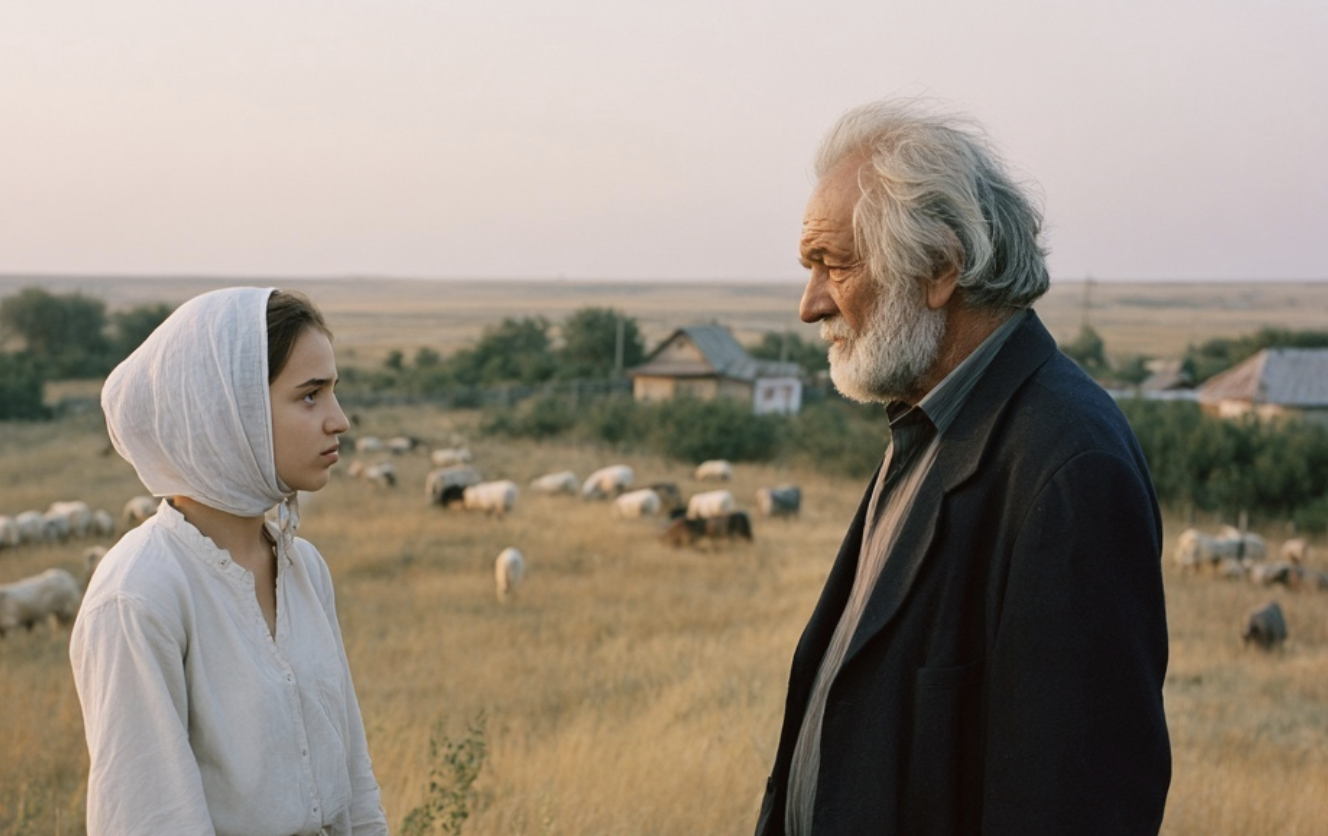Life in the village of Orekhovo was like an old, sun-faded photograph—achingly familiar, washed-out, but no less dear to the heart for it. For Alisa, this little world, tucked away among endless fields and whispering forests, was both cradle and cage. She grew up to the accompaniment of cows’ lowing and the morning clatter of milk pails, surrounded by clouds of steam from fresh milk—the very scent of her mother, Lyudmila.
Lyudmila was a milkmaid, just like her mother and grandmother before her. Her hands, rough and perpetually reddened from work, embodied selfless love. They milked cows, scrubbed clothes, cooked humble cabbage soup, stroked her daughter’s hair at night, and tucked in her son’s blanket. Their father, a forester with clear eyes and a gentle voice, was gone by the time Alisa was six. Poachers, caught in the act of butchering an elk, chose an unthinkable crime over prison. One evening he simply never came home; three days later they found him in a remote ravine. From then on, Alisa’s world was divided into “before”—bright, sunny, smelling of her father’s leather jacket—and “after”—gray, tense, heavy with her mother’s unspoken grief.
In this “after,” her younger brother Gleb was born. A fragile, fair-haired boy who looked at his sister with a mix of adoration and fear. Alisa became everything for him: nanny, protector, teacher. After school she didn’t go to the river to sit with friends, but to pick up Gleb, feed him, help with homework, and then meet her weary mother at the door with a hot dinner. In summers, while other girls sunbathed on haylofts and flirted with boys, Alisa, in an old work coat worn through at the elbows, labored for the local farmer, Arkady Petrovich—pulling weeds, stacking hay, tending calves. Any work was welcome.
It was Arkady Petrovich, a man with a face like a baked apple and a shrewd, calculating gaze, who once made Lyudmila a “profitable offer.” Catching her after her shift, brushing tobacco crumbs off his vest, he said:
“Lyudmila, why wear yourself out? Trading your life for milk. There’s a simpler way. My Svetka’s no good, but your flower Aliska is a hardworking, modest girl. Marry her to my son—life gets easier for you, and my boy’s in good hands. It’s not like Aliska will run off to the big city. That’s no job for a queen.”
Lyudmila, clenching her cracked fingers, shook her head, looking toward the cemetery where her husband slept:
“Happiness must come on its own, through love. You don’t trade it.”
“There’s no happiness without money. That’s what I say,” the farmer replied flatly. “With Svetlan your Aliska wouldn’t be lost! Hot-tempered, sure, but smart.”
“Hot-tempered” was a soft euphemism for the farmer’s perpetually drunk, brutish son, already notorious for his brawls. Lyudmila refused. She would not sell her daughter like a calf at the fair. They would survive.
Their hope lay in weekends. At dawn, mother and daughter loaded milk cans, jars of sour cream and cottage cheese, wrapped in clean towels, onto a cart and hauled them to the district market. For Alisa this was a whole new world: the cries of vendors, the smell of spices and fresh bread, the riot of fabrics and curious glances. Many eyes lingered on her beauty—tall, strong, with a wheat-blond braid and eyes like lake water. Boys from the trade school, dressed-up sellers, even respectable men found excuses to buy from her and invite her out. Alisa only blushed, politely but firmly declining, saying she was too busy. And it was true: her life left no room for idle courtships.
Then one Saturday, a car of a class seen only on television in their parts rolled up to their humble stall. A man in a flawless suit and sunglasses stepped out—not a driver, but a shadow embodied in discipline. He surveyed their modest goods.
“I’ll buy everything,” he said evenly, without emotion.
Alisa nearly jumped.
“E-everything?” she stammered.
“Everything,” he nodded, pulling out a thick stack of bills.
He loaded their jars and cans into the trunk with surprising care, paid without waiting for change, and left. Only after the car disappeared into the dusty haze did Alisa notice a dim figure in the tinted backseat—a silhouette that had been watching her intently all along. The gaze was heavy, almost tangible, and it sent shivers down her spine.
The next week it repeated. The same car, the same man, the same words: “I’ll buy everything.” Afterward, he returned from the car holding a huge bouquet of white roses and eustomas, wrapped in designer paper and tied with silk ribbon.
“This is for you,” he said, handing it to the stunned girl. “My employer asked me to deliver it.”
Awkwardly wiping her hands on her apron, Alisa took the flowers. The fragrance of roses, mixed with milk and market dust, was the strangest and most overwhelming scent she had ever known.
“Thank… your employer,” she whispered.
The third time, she already knew. This was no charity. It was a proposal—deliberate, powerful, masculine. And she was right. The man lingered a moment after paying.
“Miss, my boss asked me to say he finds you very charming. He wishes to ask for your hand. He’s a wealthy man and will solve your family’s every financial problem. He asks only for the chance to meet.”
That evening, the old kitchen phone rang—its jangle usually heralding bad news. But this voice was new: deep, velvety, with a noble rasp and a hypnotic calm.
“Alisa? Forgive my bluntness. This is Stepan. From the market. Your voice is exactly as I imagined it—warm. I like you very much. I could make you happy, if you let me.”
Thus began their strange telephone romance. Each evening, when Gleb slept and Lyudmila grew weary by the stove, Alisa sat on the porch, pressing the receiver to her ear. He never boasted of wealth. He spoke of business, travel, books, music, of the quiet family happiness he longed for. He was witty, educated, attentive. He asked about her day, her brother, her mother. He listened—truly listened. And Alisa, who had never known a man’s affection beyond her mother’s care, began to soften. She longed to see the man behind that enchanting voice.
And one night, when he said, “Alisa, I can’t wait any longer. I want you to be my wife,” she answered without hesitation: “Yes.”
Lyudmila wept, begging her to reconsider.
“Child, do you even understand? He’s sixty! You’re blooming, and he… You’ll bury your life!”
“Mama, he’s wonderful!” Alisa cried. “Kind, wise, caring. He already looks after us! He’s not old, he’s… wise. This is what I want.”
The wedding was lavish—legendary by Orekhovo standards. A couture gown, limousines strewn with rose petals, crowds of curious strangers. In the registry and the church awaited her groom: tall, fit, with silver at his temples and a flawless tuxedo. His face was lined with age, but his eyes burned with a youthful fire. His hand, as he slipped on the ring, was steady, sure. He whispered: “I promise to cherish and love you all my days.” And she believed him.
Their wedding night was to be in his mansion of glass and stone, rising like a mirage in the dark park. Alisa sat on the edge of the vast bed in bridal lingerie, listening to the shower next door, her heart pounding with fear, expectation, and submission. The water stopped. The door opened.
And she lost her breath.
In the doorway stood a young man—barely thirty. Wet dark hair on his brow, no wrinkles, no gray. But the eyes—those same wise, calm eyes—now shone with daring, youthful ardor.
“Stepan?” she whispered, voice trembling. “What… what is this? Is it you?”
He smiled—so charming and guilty at once that she gasped.
“Yes, my dear. The real me. You didn’t marry a decrepit old man. You married a young millionaire, madly in love with you, afraid of being loved only for his money.”
It spilled out: how he’d seen her once at the market, how her tired, luminous smile had undone him. How he feared his fortune would eclipse his soul. How the disguise was his only chance to let her hear his mind, his heart, his soul.
Alisa slid to the floor, shivering with goosebumps. He called it a circus—but it was the most elaborate, costly, terrifyingly bold gamble for love she could imagine. A deception, yes—but born of fear of deception. A trap, but one that paradoxically gave her freedom.
She looked at him—handsome, vulnerable, brilliant, insane. Her fear ebbed, replaced by a storm of emotions: relief, joy, fury, tenderness, pity, and understanding. Profound understanding.
“I… I’m married to you,” she said, not asking, but realizing.
“Yes,” he whispered, eyes wet. “And from now on, it will be real. No masks. Just us.”
Morning revealed everything. Friends who had sneered at her “rich old geezer” were struck dumb with envy at the stunning couple. Lyudmila cried tears of joy. Gleb gazed at Stepan as if he were a superhero.
But the deepest chills came later, at night, when Alisa awoke to the moonlight on her husband’s sleeping face—young, defenseless, real. She remembered the voice on the phone, the gaze from the car, the old man at the altar. She realized she had married two men at once: the wise, calm one who won her mind by phone, and the fiery, passionate one who would have seized her heart with a glance at the market.
And both were him. Her Stepan. Her mystical, terrifying, dizzying, and truest happiness—arriving under the mask of deceit, only to give her the most genuine truth.



